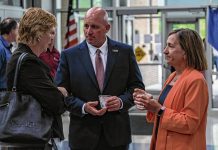A law professor and author gave a Columbus audience a master class on why American’s political debate has become less civil and more polarized, and offered some suggestions of how to reverse the trend.
As keynote speaker for this year’s Columbus Human Rights Commission annual meeting Thursday night at The Commons, Sheila Suess Kennedy captivated a crowd of about 350 guests with observations based on her work teaching law and public policy at IUPUI’s School of Public and Environmental Affairs.
Her areas of expertise include constitutional culture, civil rights and religion and public policy, all of which she touched on in her speech.
Civil literacy, and Americans’ appalling lack of it, was a point Kennedy made in her speech, pointing out a study showing while 43 percent of Oklahoma high school seniors could name the two major political parties in the United States, only 23 percent could name the country’s first president and 27 percent could name the two parts of Congress. Eleven percent of the students surveyed knew how many years a U.S. senator is elected to in a term.
[sc:text-divider text-divider-title=”Story continues below gallery” ]
This lack of knowledge about how American government works is one of the primary factors leading to lack of civil engagement in dialogue or the political process, Kennedy said.
“Why does it matter? Well, for one thing, productive civic engagement is based on an accurate understanding of the ‘rules of the game,’ especially, but not exclusively, the Constitution and the Bill of Rights — the documents that frame policy choices in the American system,” she said.
Kennedy spent some time explaining how the American Constitution came out of the 18th century movement knows as the Enlightenment, which gave the world science, empirical inquiry and the natural rights and social contract theories of government. She explained that Enlightenment also changed the way we understand and define human rights and individual liberty.
Kennedy spent some time explaining how America’s founders created a paradigm shift from previous views of liberty, creating more of a negative liberty to safeguard fundamental rights.
Negative liberty means individuals would be entitled to rights simply by being human, not by being granted rights as subjects to a government, and that government has an obligation to respect and protect those inborn, inalienable rights, she said.
The Bill of Rights doesn’t grant Americans rights, Kennedy said. Instead, it protects Americans’ rights against infringement from an overzealous government, she said.
“The once-radical idea that each of us is born with the same claim to human rights has other consequences,” Kennedy said. “It means the governments have to treat their citizens as individuals, not as members of a group. America was the first country to base its laws upon a person’s civic behavior, not gender, race, religion or other identity or affiliation.”
As a result, when Americans obey laws and pay their taxes and conduct themselves in a lawful manner, they enjoy full civic equality — and when America has lived up to that idea, it has unleashed the productivity of previously marginalized groups, Kennedy said.
In addition to that civic equality, Kennedy said citizens also have the equal right to participate in self government, something that is regressing amidst what she described as society becoming less democratic through vote suppression, money spent by special interests and gerrymandering.
Impact of gerrymandering
“With gerrymandering, there are no good guys in this story,” Kennedy said. “Gerrymandering is a crime of opportunity, and both political parties are guilty.”
She blamed gerrymandering for much of the political polarization and the decline in competition in political races, also factors she said lead to less civil engagement in government.
One of the worst results of gerrymandering, where parties set up voting districts to favor a candidate or a political party, is that it creates voter apathy, she said.
“Why vote when it won’t matter?” she asked.
There is no reason to vote for the challengers, because they can’t win, she said.
“Gerrymandering should be seen as an assault on human rights,” she asserted, adding that in safe districts, the only way to challenge an incumbent is to run against them in a primary and attack from the flank — either the extreme right or the extreme left.
“Safe districts do more than disenfranchise voters. They are the single greatest driver of governmental dysfunction,” Kennedy said. “When the primary is, in effect, the general election, the battle takes place among the party faithful, who also tend to be the most ideological voters,” she said.
Where those challenges fail, they do create a powerful incentive for incumbents to toe the line, to placate the most rigid elements of their prospective parties, she said.
“Instead of the system working as intended, with both parties nominating candidates they think will be most likely to appeal to the broader constituency, the system produces nominees who represent the most extreme voters on each side of the philosophical divide,” she said.
Kennedy said Indiana had been rated as the fifth most gerrymandered state in the nation, and had the opportunity to change that this past legislative session when a bill was introduced seeking an independent redistricting commission, which droves of Indiana residents came out to support.
She noted that the chair of the committee where the bill was heard, Rep. Milo Smith, R-Columbus, refused to allow a vote on it in committee, effectively killing the bill.
Plight of working poor
Kennedy reminded listeners of a 2014 study by the United Way which found one in three Indiana households considered an ALICE family — asset-limited, income-constrained and employed.
All of these families have at least one full-time worker in the household — clerks, office assistants, laborers and drivers, for example — but do not qualify for social services based on income, but can’t afford basic necessities to live in Indiana, she said.
“A citizen working two or three jobs just to put food on the table doesn’t have much time for civic engagement. And in Indiana, that’s a lot of people,” Kennedy said. “We all need to recognize that there are people preoccupied with their existence.”
Agencies such as the Columbus Human Rights commission are important for enforcing civil rights and helping the electorate turn back the assault on the ballot box and to improve civil literacy, she said.
“Human rights depends on a civically informed and civically-engaged electorate,” Kennedy said. “It won’t be easy, but we can do this.”
Speech reaction
The Rev. Felipe Martinez, pastor of First Presbyterian Church in Columbus, said Kennedy’s talk was an invitation to civic involvement and democratic literacy.
“I am a naturalized citizen of the United States,” he said. “I knew the answers to those questions. We had to know them to gain citizenship,” he said of becoming an American citizen a decade ago this September.
He described Kennedy’s talk as an invitation to becoming more engaged in the political process and create more dialogue among people to be able to talk with each other without fear.
“What is interesting to me is whether people heard it as partisan, because clearly it was not,” he said.
“She was tremendous,” said Annette Barnes, a commission member who has served on the panel since 2013. Barnes said Kennedy’s thoughts were a reminder of the importance of focusing on civil literacy not just for young people, but for everyone, including adults.
During a short question-and-answer session after her speech, commission member Matt Souza asked Kennedy whether it was time in America for another Enlightenment, similar to the redefinition of liberty, to which Kennedy replied, “Oh boy,” and the audience chuckled.
“It’s definitely time for mutual respect and less partisanship,” she said, and advised she felt the United States needed to take a deep breath right now.
“The recently concluded presidential campaign uncovered a lot of ugliness that a lot of us thought we had gotten beyond,” she said. “There are a lot of people whose lives have not gone the way they wanted them to go, and people are saying it must be the guy across the border’s fault, or the uppity women. We need to step back and recapture that we’re all in this together.”
Kennedy said her message of hope is that if she could turn this country over to her students, it would be in the hands of the most inclusive, kind and caring individuals she has ever met — a group who really do care about getting back to the idea of community.
“I tell them once you kill off my age cohort, things really will improve,” she said, drawing laughter from the crowd.
[sc:pullout-title pullout-title=”Award winners” ][sc:pullout-text-begin]
Six youth art or essay contest winners were introduced during the Human Rights Commission’s annual meeting.
J. Irwin Miller Art Contest winners
- Elementary school: Jessica Meza, St. Bartholomew Catholic
- Middle school: Emma Nolting, Central Middle
- High school: Kate Stewart, Columbus North
Benjamin M. King Essay Contest winners
- Elementary: Fareeha Parvin, Southside Elementary
- Middle school: Jordan Spurgeon, Central Middle
- High school: Emma Perry, CSA New Tech
[sc:pullout-text-end][sc:pullout-title pullout-title=” Sheila Suess Kennedy” ][sc:pullout-text-begin]
Profession: Professor of law and public policy at the School of Public and Environmental Affairs at IUPUI. Fields of expertise include constitutional culture, charitable choice, civil liberties and civil rights, religion and public policy, nonprofit organizations, and media and public policy.
Past involvement: Former executive director of the Indiana Civil Liberties Union; faculty fellow with the Center for Religion and American Culture and the Tobias Center for Leadership Excellence; founder of the Center for Civic Literacy at IUPUI; former Republican candidate for the 11th Congressional District.
Author: “Giving Civics a Sporting Chance,” 2016, with co-author Matt Impink; “American Public Services: Constitutional and Ethical Foundations,” 2010; and “What’s a Nice Republican Girl Like Me Doing at the ACLU?” 1997.
Honors: IUPUI Inspirational Woman Award, 2015; Chancellor’s Faculty Award for Excellence in Civic Engagement, 2010, among others.
Education: Graduate of Stephens College for Women, Indiana University, and Indiana University School of Law.
Family: Married to Bob Kennedy; five children and four grandchildren.
[sc:pullout-text-end]




